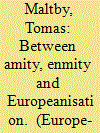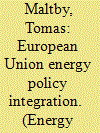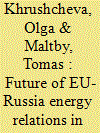|
|
|
Sort Order |
|
|
|
Items / Page
|
|
|
|
|
|
|
| Srl | Item |
| 1 |
ID:
139278


|
|
|
|
|
| Summary/Abstract |
Considering the development of the Bulgarian energy security strategy this article analyses how the country has adapted to EU membership and to energy security challenges, such as disruptions to Russian gas supplies in 2006 and 2009 and rising gas prices. Utilising a conceptual lens which synthesises Regional Security Complex Theory and Europeanisation, the article offers an explanation of energy policy changes. It concludes that conceptions of Russia as an energy security guarantor have changed since Bulgaria's EU accession and that Bulgarian energy policy has undergone a qualified reorientation away from a positive dependence on Russian energy sources, towards a convergence with EU priorities of diversification and a single energy market.
|
|
|
|
|
|
|
|
|
|
|
|
|
|
|
|
| 2 |
ID:
119818


|
|
|
|
|
| Publication |
2013.
|
| Summary/Abstract |
Focusing on gas, this article explores the role of the European Commission in the process of European Union energy security policy development, and the extent to which the policy area is becoming increasingly supranational. Situating the article within the literature on agenda-setting and framing, it is argued that a policy window was opened as a result of: enlargement to include more energy import dependent states, a trend of increasing energy imports and prices, and gas supply disruptions. From the mid-2000s, the Commission contributed to a shift in political norms, successfully framing import dependency as a problem requiring an EU-level solution, based on the institution's pre-existing preferences for a diversified energy supply and internal energy market. Whilst Member States retain significant sovereignty, the Commission has achieved since 2006 creeping competencies in the internal, and to a lesser extent external, dimensions of EU energy policy.
|
|
|
|
|
|
|
|
|
|
|
|
|
|
|
|
| 3 |
ID:
150533


|
|
|
|
|
| Summary/Abstract |
In 2013, there was a joint commitment to “long term strategic EU-Russia energy cooperation”.11. EU/RF Roadmap, ‘Roadmap EU-Russia Energy Cooperation until 2050‘, European Commission and Russian Government, March 2013, p. 4, available at .
View all notes
Whilst centred on oil and gas, it is noted that “the importance of renewables for EU-Russia energy relations should grow too”,22. Ibid., p. 21.
View all notes
and that for energy efficiency, “cooperation potential is immense and could… contribute to the objective of a Pan-European energy area”.33. Ibid., p. 26.
View all notes
Given this shared objective, this article analyses EU and Russian energy decarbonisation policy objectives and considers the potential for a supplementary trade relationship based on renewable energy flows and decarbonisation-related technology, as well as the implications for existing energy trade. Despite declarative statements of mutual interest, shared objectives and cooperation in decarbonisation policy, there has been very limited cooperation by early 2016. The EU has set ambitious plans to decarbonise its economy and energy sector by 2050. However, in Russia energy policy is dominated by hydrocarbon exports, decarbonisation targets are modest, and there are major problems with their implementation. The drivers of EU and Russian energy policies are evaluated, and the argument advanced is that different understandings of energy security and types of energy governance provide major obstacles to decarbonisation cooperation and trade. However, it is argued that ideas about energy policy and security are contested and subject to change and there exists significant potential for mutual gain and cooperation in the longer term.
|
|
|
|
|
|
|
|
|
|
|
|
|
|
|
|
|
|
|
|
|